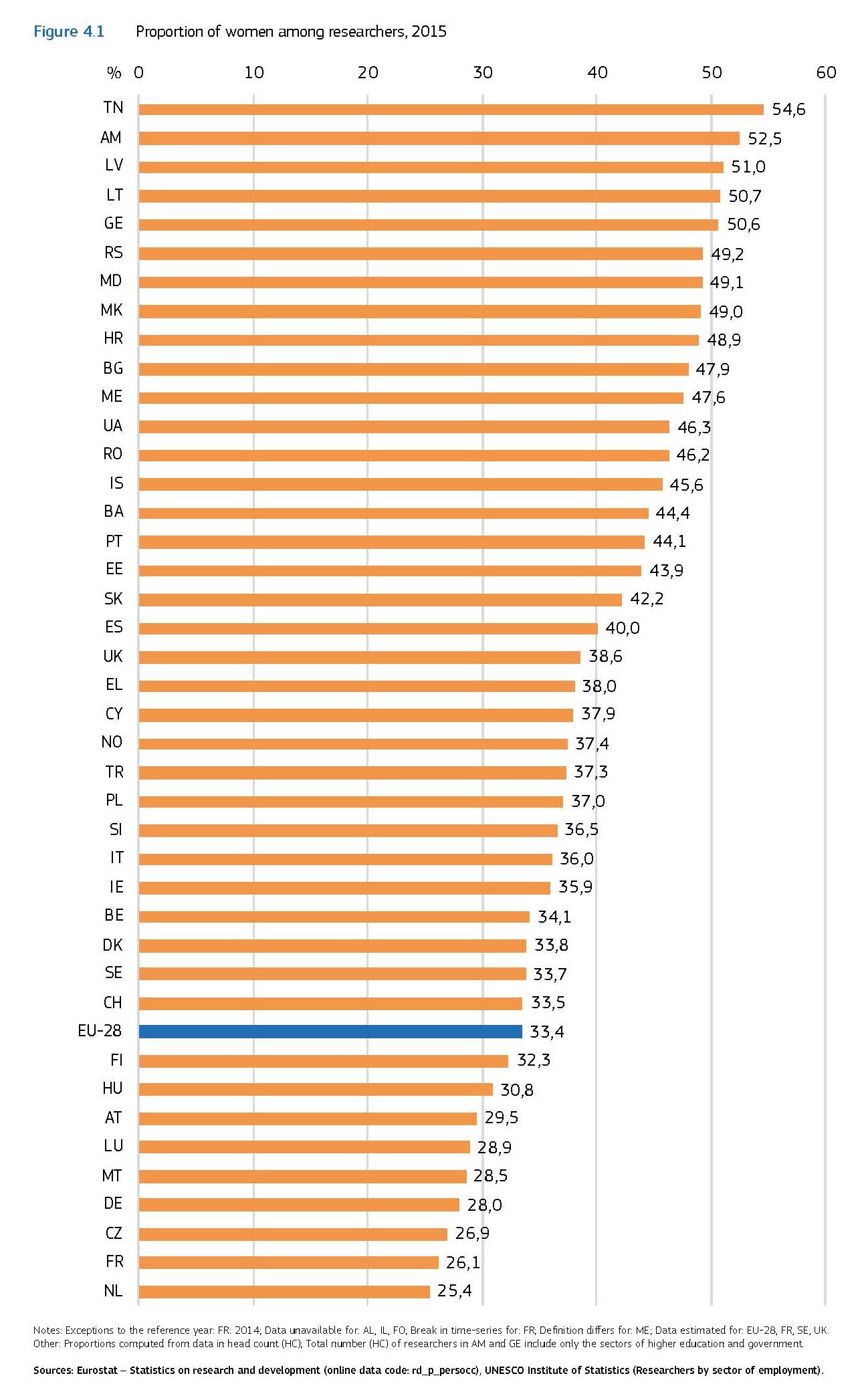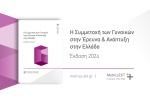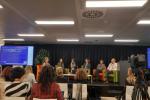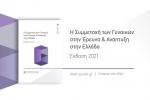
Gradual progress towards reducing disparities and gender convergence in research, technology and innovation has been recorded in recent years, according to the ‘She Figures 2018’ report recently published by the European Commission.
The ‘She Figures’ report, compiled by the Directorate General for Research and Innovation, European Commission, has been published every three years since 2003. It includes data on employment of European researchers in the 28 member states of the EU and shows the level of progress made with regard to achieving the goal of gender equality in research, technology and innovation.
According to the report, there was increased participation of women in a number of indicators such as the number of young doctoral students per year, employment in knowledge and technology intensive professions, the number of female researchers, participation in outputs and results, (eg scientific publications). The report also included the differences in working conditions as regards pay and professional development opportunity are also captured.
During the period 2007-2016, the number of women doctorate holders rose on a European level at a greater rate than that of men. In all countries participating in the study, the percentage of women among doctoral students who graduated in 2016 was over 40%.
In terms of professional employment in knowledge and technology intensive activities during the period 2013-2017, the number of women working as engineers and scientists increased at an annual growth rate of 2.9% compared with 2.2% for men. The percentage of women working in knowledge intensive activities –KIA, both in public and private sectors, was higher than men in all European countries. In Greece in 2017, the figures were 42.3% for women and 29.8% for men. In 2017, women involved in knowledge related activities in business were also more than men (13.0% and 11.5% respectively).
Regarding employment in research activities during the period 2008-2015, the number of women researchers increased at European level, with rates greater than male researchers (3.8% vs. 3.4%).
In 2015, women researchers in the EU28 made up 33.4% of the total number of researchers. In Greece, that percentage was 38.0, higher than the European average and countries such as Italy and Ireland.
The percentage of women researchers in Greece was also higher than the European average in the state (43.0% compared to the European average of 42.5%) and the business sectors (27.6% compared to 20.2%). In the higher education sector, with 37.7% for women researchers, Greece lagged behind the European average (42.1%).

The employment situation of female researchers remains more difficult than that of male researchers. According to the findings, at a European level, 13.0% of female researchers compared to 8.0% of male researchers worked part-time in higher education in 2016, while the income of women employed in research and development activities was 17% lower than male colleagues in 2014. In Greece, women working in such activities earned 23.1% less, while the disparity between the sexes across the Greek economy was in the order of 12.5%.
On the issue of academic advancement and participation in management, the proportion of women decreased at each subsequent academic rank. Europe-wide, women made up 58% of undergraduate and graduate students, a figure that dropped to 48% for women doctoral students, and reached 24% of level A academic positions (Professor) in 2016. This particularly applied to science, technology, engineering and mathematics (STEM), where the participation of women was significantly lower at all academic levels.
Only 32% of undergraduates and graduates were women and 15% of level A academic positions (Professors) were held by women. In Greece, 14.9% of women held level A academic positions, while the European average was 7.4%, putting the country ahead of France, Italy, Great Britain and Sweden. In 2016, Greece was one of the countries at the bottom of the table regarding glass ceiling performance (1.42), while the European average was 1.64, indicating a less difficult transition to higher academic ranks.
On the question of research and innovation outputs and results, Europe-wide percentages for women authors of scientific publications relative to male peers grew annually by 3.9% for the period 2008-2017. Additionally, the impact of scientific publications which have been written by women was equal to that of men (0.90). However, women still lag behind men significantly in the submission of patents, as well as their performance in successful research proposal submission. As far as Greece is concerned, in 2017, scientific publications by women using normalised relative impact index was 0.98 (the value of 1 representing parity between men and women authors) and the European average was 0.90, putting the country ahead of almost all other European countries.
EKT actions for the participation of women in research
The National Documentation Centre (EKT) was the statistical representative of Greece for the ‘She Figures 2018’ report. EKT has actively supported the strengthening of the participation in the European Research Area since 2007 by undertaking specific actions in national and European projects. After extensive inventory of Greek women researchers through the ‘Mapping Scientific Area of Greek Female Research Personnel’ project and participation in the European projects GENDERA and SHEMERA, EKT has produced indicators and publications on women's participation in Research and Development (R&D) in Greece.
EKT is participating in a new European project GENDERACTION (Gender Equality in the ERA Community to Innovate Policy Implementation), the aim of which is the strengthening of gender equality and the inclusion of the gender dimension in research, and which is being funded by Horizon 2020. At the same time, EKT supports research into gender equality through its actions as National Contact Point for the Horizon 2020 programme ‘Science with and for Society’.
EKT’s next planned publication will include data on the participation of researchers in academia and business, as well as their participation in European and nationally funded projects. It will be complementary to ‘She Figures’ and will provide a deeper analysis of the relevant dimensions at a national level.
















